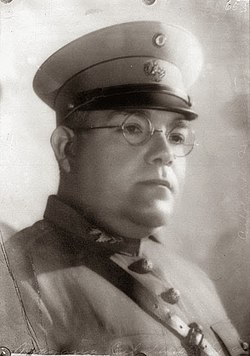Gildardo Magaña
Gildardo Magaña Cerda (March 7, 1891 – December 13, 1939) was a Mexican general, politician and revolutionary.
Gildardo Magaña | |
|---|---|
 Gildardo Magaña Cerda | |
| Birth name | Gildardo Magaña Cerda |
| Born | March 7, 1891 Zamora, Michoacán, Mexico |
| Died | December 13, 1939 (aged 48) Mexico |
| Allegiance | |
| Service/ | Mexican Army |
| Rank | General |
| Battles/wars | Mexican Revolution |
Born on March 7, 1891 in Zamora, Michoacán, to a Liberal trading family and was sent to study economy in the U.S. Back in Mexico he was involved in the anti-reelectionist movement and had to flee to the insurrectionist Zapatista country people in Morelos in 1911. He was immediately made use of as emissary to various revolutionaries in different parts of Mexico, among others to Pancho Villa whom he is reported to have taught reading. In 1916 he was appointed chief of staff to Emiliano Zapata, because he was the only one who was able to make unruly sub-commanders of the movement cooperate instead of quarrel, using his personal charm as well as his outstanding diplomatic skill for the task.
When Zapata was killed in 1919, Magaña was elected his successor with 18 votes against 11 for Jesús Capistrán. As commander-in-chief of the Zapatist army, he made it his supreme business to achieve a durable peace. To that purpose he cultivated various possible allies, in vain until Álvaro Obregón revolted in 1920. Magaña immediately declared his and his movement's support and provided Obregón with the army with which he conquered Mexico D.F. In return, the movement got the Ministry of Agriculture and its desired agrarian reform made law.
Under Obregón's and his successors' presidencies, Magaña held several high military commands but also found time to found the Confederación Nacional Agraria, the Cardenist peasants’ union. In 1936 he was elected governor of his native state of Michoacán, a post he held until his death (by a heart attack) in 1939. Shortly before his death he was suggested as a candidate for Lázaro Cárdenas's successor as president but declined.
Literature
- John Womack: Zapata and the Mexican revolution, Vintage 1968.